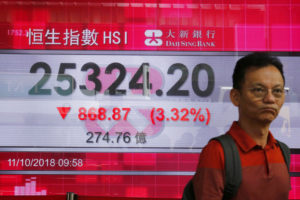A surge of hot money outflows in September reversed the Philippine economy’s gains of attracting more portfolio investments into local financial markets over the two previous months, data from the Bangko Sentral ng Pilipinas revealed on Thursday.
In a statement, the central bank said that last month’s transactions yielded net outflows of $440 million, in contrast to the net inflows of $226 million in August, as and net inflows of $113 million recorded a year ago.
“This may be attributed to investors’ continuing concerns on trade tensions between the United States and China, the weakening of the Philippine peso and the continued uptick in inflation which may have been aggravated by the effects of Typhoon Ompong (International codename: Mangkhut),” the BSP said.
Registered investments for the month of September amounted to $743 million, reflecting a 33.7 percent decrease from the $1.1 billion figure in August. Likewise, a 42.7 percent year-on-year decline was noted from the $1.3 billion level recorded during the same month last year.
Of the investments that were registered last month, 85.7 percent were allocated to listed securities in the Philippine Stock Exchange (pertaining mainly to holding firms, banks,
property companies, food, beverage and tobacco firms, and telecommunication companies). The balance went mostly to peso-denominated government securities (14.3 percent).
Net outflows were noted for all investment instruments. PSE-listed securities saw $351 million in outflows, $89 million for peso-denominated government securities and less than $1 million in outflows for other peso-denominated debt instruments.
The United Kingdom, the United States, Singapore, Switzerland and Malaysia were the top five investor countries for the month, with combined share to total at 81.8 percent.
Outflows for the month ($1.2 billion) were higher by 32.2 percent vis-a-vis August 2018 level ($895 million). A minimal decline of less than $1 million was noted when said amount was compared to the level recorded in September 2017 of $1.2 billion. The US continued to be the main destination of outflows, receiving 73.7 percent of total remittances.
Registration of inward foreign investments with the BSP is optional under the liberalized rules on foreign exchange transactions. The issuance of registration documents entitle investors to buy foreign exchange from authorized financial institutions for repatriation of capital and remittance of earnings that accrue on the registered investment.


